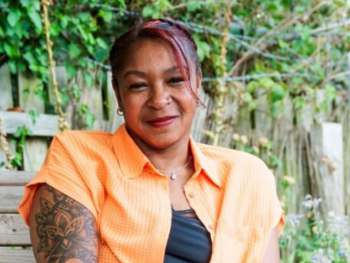University News Last updated 25 September 2023

Thinking a heart attack is “just like you see in the movies” can be a major mistake warns a senior nursing lecturer after giving her backing to a new lifesaving campaign from the NHS.
Birmingham City University (BCU) academic Jaye Ryan was struck down by a “horrendous pain” and left immobilised for several minutes while at home in March 2022.
“You see people clutching their chest and falling to the floor dramatically when they suffer a heart attack in films or on television,” said Jaye.
“That’s not reality. It certainly wasn’t the case for me.
“The pain went through my chest, into my back and shoulder blades. My jaw and neck felt frozen - it felt like an intense cramp - but my arms were floppy.
“I stumbled to the bedroom and lay on the floor, facing a mirror. It was very haunting. I looked at myself and thought I was going to die if the pain didn’t go away.”
The pain did eventually subside, but Jaye did not seek hospital treatment at first. Instead, she went to work the next day, turning up at BCU to deliver one of her lectures.
“A colleague saw that I didn’t look my usual self as I had struggled to climb the stairs to my office and could now feel a dull ache in my chest,” said Jaye, a former children’s nurse with the Birmingham Women’s and Children’s NHS Foundation Trust.
“She told me to go to A&E. I did, but I left my keys and my bag behind because I was convinced there was nothing much wrong and I would be back in an hour or two.”
It turned out she was wrong. Jaye had suffered a heart attack - and her life immediately changed.
“I had no pre-existing conditions, there was no history of heart problems in my family, and I was physically fit,” said Jaye, who recently celebrated her 57th birthday. “I’m a former nurse and I didn’t think it was a heart attack. I was completely shocked.”
NHS figures show that there were more than 84,000 hospital heart attack admissions in England during 2021/22, up by more than 7,000 compared to the previous year, when fewer people came forward for care during the pandemic.
The chances of surviving a heart attack are far higher if care is sought quickly. Around 7 in 10 people survive, increasing to more than 9 in 10 for those who reach hospital early to receive treatment.
According to the NHS, the symptoms of a heart attack can include:
-
chest pain – a feeling of pressure, heaviness, tightness or squeezing across your chest;
-
pain in other parts of the body – it can feel as if the pain is spreading from your chest to your arms (usually the left arm, but it can affect both arms), jaw, neck, back and tummy;
-
feeling lightheaded or dizzy;
-
sweating;
-
shortness of breath;
-
feeling sick (nausea) or being sick (vomiting);
-
an overwhelming feeling of anxiety (similar to a panic attack);
-
coughing or wheezing.
While the chest pain can be severe, some people may experience minor pain, similar to indigestion.
After a phased return to work, Jaye, who convenes an online MSc Nursing course for BCU, is warning others not to dismiss or ignore the common signs of a heart attack, no matter how minor the symptoms or the briefness of the episode.
“The symptoms are not the same for everyone, especially for women but you have to take notice if you don’t feel right,” she said. “I would encourage anyone who thinks they might be having a heart attack to call 999.”